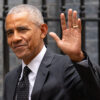Despite the Clinton Administration’s failed efforts to ratify the Comprehensive Test Ban Treaty (CTBT) in 1999, the Obama Administration believes the time is right for another attempt in the U.S. Senate, writes Heritage analyst Peter Brookes. Such optimism overlooks the realities of the current strategic environment, in which numerous states such as North Korea and Iran are either seeking nuclear weapons or expanding their arsenals.
Furthering the White House’s CTBT optimism is the ratification of the New Strategic Arms Reduction Treaty last December. According to Ellen Tauscher, Under Secretary for Arms Control and International Security, “The New START debate, in many ways, opened the door for the CTBT.” The reality, however, is that the problems that derailed CTBT more than a decade ago remain present and in many cases have grown worse.
The most significant concern is the atrophy of the U.S. nuclear weapons complex since the end of the Cold War. The Administration’s recent efforts to increase funding for the National Nuclear Security Administration are not enough to modernize the outdated arsenal.
The CTBT suffers from other problems as well. These include ambiguity regarding a definition of what actually constitutes a nuclear weapons test and problems with verification. The U.S. interpretation of a nuclear weapons test is that the treaty bans all explosive nuclear testing. Yet Russia and China do not share this view and claim that low-yield nuclear weapons tests, which both countries likely still conduct, do not constitute a violation of the treaty. In addition, it is impossible to monitor low-yield nuclear weapons tests or underground detonations—rendering any zero-yield ban unverifiable.
Finally, a credible nuclear deterrent rests on America’s confidence to deploy nuclear weapons and the world’s perception that these weapons will do exactly what they are supposed to do once the U.S. leadership needs them. The CTBT would impede the U.S.’s ability to modernize its nuclear weapons stockpile or adapt existing warheads for new missions. This comes at a time when Russia and China are actively modernizing their nuclear forces.
Nuclear weapons testing is essential for keeping the U.S. stockpile safe, secure, and reliable in the years ahead. Ratifying the CTBT would be detrimental to U.S. national security interests, as 30 countries around the world rely on the credibility of U.S. extended deterrence. These countries would be incentivized to develop their own nuclear weapons capabilities if the United States were perceived as weak and its nuclear weapons unreliable.
Jake Wilson is currently a member of the Young Leaders Program at The Heritage Foundation. For more information on interning at Heritage, please visit: http://www.heritage.org/about/departments/ylp.cfm


























